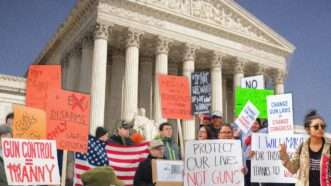Property Rights
This California Family Is Suing for the Right To Drill for Oil on Their Own Property
“We’re standing up not just for ourselves, but for the principle that government must respect property rights.”
More Historical Evidence Showing that the Public Use Clause of the Fifth Amendment Does Not Allow Takings that Transfer Property to Private Parties
Harvard law Prof. Maureen Brady uncovers relevant evidence from late-nineteenth century state constitutional conventions.
Trump Issues Order Cracking Down on Corporate Homeownership
The president's order is not the comprehensive ban on large investor–owned housing that he promised. But it could still have a chilling effect on the single-family rental market.
Bureau of Land Management Says Bison Are Not Livestock, Obstructing Plans for a Huge Private Prairie Reserve
The American Prairie nonprofit seeks to create a 5,000-square-mile prairie reserve in Montana where buffalo may roam and antelope play.
SCOTUS Seems Inclined To Reject Hawaii's Default Rule Against Guns on Private Property Open to the Public
The state requires carry permit holders to obtain advance permission before bringing firearms into businesses.
Mamdani's Promise of the 'Warmth of Collectivism' Is a Lie. Just Ask All the Failed Communes.
History is very clear that property rights and capitalism are necessary for society to flourish.
Barring Institutional Investors From Buying Homes Won't Make Housing More Affordable - and Would Likely Make Things Worse
There is no evidence that institutional investors increase prices. Barring them from the market could actually exacerbate the housing crisis.
If You Give a Bear a Badge, Will It Respect Your Rights?
Despite their general ignorance of constitutional law, bears pose a much less grave threat to your civil liberties than humans do.
Yale Journal on Regulation Symposium on the 20th Anniversary of Kelo v. City of New London
I co-edited the symposium along with Eric Claeys and David Schleicher, and am also one of the contributors.
Brennan Center Symposium on "2025's Most Significant State Constitutional Cases"
Contributors include Eugene Volokh and myself, among many others.
Our Amicus Brief in the Pung v. Isabella County Home Equity Theft Takings Case
I wrote it (with help from others) on behalf of the Cato Institute and a group of takings and property scholars.
Non-Paywalled Version of My Washington Examiner Article on "Foot Voting, Housing, and Affordability"
The Cato Institute has posted one on its website.
My New Washington Examiner Article on "Foot Voting, Housing, and Affordability"
We can make housing more affordable and empower people to "vote with their feet" by curbing exclusionary zoning. Left and right should support that instead of counterproductive snake oil like rent control, tariffs, and deportations.
Covid Beach Closures, the Takings Clause, and the Police Power Exception
A recent 11th Circuit decision rightly ruled that mandatory Covid beach closures violated the Takings Clause. But the court overlooked the key issue of how to assess the "police power" exception to Takings Clause liability.
COVID Closure of Private Beach Access Constitutes a Taking
The Eleventh Circuit concludes "there is no COVID exception to the Takings Clause."
Federalist Society National Lawyers Convention Panel on Zoning, Property Rights, and the Housing Crisis
I participated along with James Burling (Pacific Legal Foundation), Prof. Peter Byrne (Georgetown), and Prof. Sara Bronin (George Washington University).
In Search of a New Environmentalism -- Hayward Replies
Steven Hayward has the final word in the recent Law & Liberty Forum on the future of environmental policy.
How Property Rights and Markets Are Overcoming the Marine Tragedy of the Commons
A discussion on the "Taboo Trades" podcast.
New Jersey Town Tentatively Agrees to Not Seize 175-Year-Old Family Farm
After a nationwide uproar over Cranbury, New Jersey's plan to seize Andy Henry's farm, the township says it's found another site to place a planned affordable housing development.
The Supreme Court Will Hear Another Home Equity Theft Takings Case
This one addresses the issue of whether the owner of a home foreclosed for nonpayment of debt is entitled to "fair market value" compensation, or only whatever the government gets from auctioning off the property, minus the debt owed.
European Nations Again Consider Using Frozen Russian State Assets to Fund Ukraine's War Effort
Over $300 billion in Russian state assets are frozen in the West. It's long past time they were used to help Ukraine resist Vladimir Putin's war of aggression.
YIMBY Reforms Win Big In State Legislatures in 2025
In 2025, momentum behind state-level supply-side housing reforms accelerated almost everywhere.
Abolish the FCC
The Trump Administration's recent abuses of the agency's powers lend weight to longstanding libertarian arguments for abolishing it, going back to Nobel Prize-winning economist Ronald Coase's classic 1959 article.
91-Year-Old Pennsylvania Woman With Dementia Loses $247,000 Home Over a $14,000 Tax Debt
Gloria Gaynor had almost finished paying off her house in Upper Darby, Pennsylvania. But she will not see a dime in equity.
In California, YIMBYs Pass Holy Grail Zoning Reform
Plus: San Francisco preliminarily passes citywide upzoning, a New Jersey town backs off family farm seizure, and YIMBY martial law ruled illegal in Hawaii.
States and Landowners Are Key to Recovering Rare Species. Stop Penalizing Them.
Federal rules under the Endangered Species Act often treat landowners as adversaries. Recent court victories suggest a better way forward.
Help Workers by Breaking Down Barriers to Labor Mobility
Labor Day is a great time to remember that we can make workers vastly better off by empowering more of them to vote with their feet, both within countries and through international migration.
New Jersey Town Drops Plan to Condemn a Church to Build a Park and Pickleball Courts
The mayor abandoned the plan after it aroused strong political resistance and threats of litigation.
New Pew Charitable Trusts Repot on "How States and Cities Decimated Americans' Lowest-Cost Housing Option"
They have done so banning or severely restricting low-cost "single-room occupancy" (SRO) housing.
Compensation for Legal Fees Is a Critical Protection Against Civil Forfeiture Abuses
A recent federal appeals court decision underlines the importance of that safeguard.
America's Housing Shortage Won't Be Fixed With 'One Weird Trick'
Highlighting individual wonky rules that drive up housing costs is good. But getting America building again is going to require more than a few marginal reforms.
Photo: A Tiny Monument to Eminent Domain Resistance in New York City
The roughly 25-inch plot has a mosaic reading, "Property of the Hess estate which has never been dedicated for public purposes."
Egypt's Land Grab Threatens the World's Oldest Christian Monastery
St. Catherine’s Monastery has been continuously inhabited for over 1,500 years. An Egyptian court ruling ended the monastery's longstanding separation from the government.
Natural Property Rights: A VC Preview
Property rights, public law, the police power, and the eminent domain power.
Nova Scotia Bans Everyone From Hiking in the Woods Until October
The province says this will prevent forest fires. Those who violate the ban will face a $25,000 fine.
Natural Property Rights: A VC Preview
Foxes, whales, and injustice toward the property claims of aboriginal tribes.
Natural Property Rights: A Volokh Conspiracy Preview
An overview. (Or, what you can learn about property from John Locke and Monty Python's Flying Circus.)
Louisiana Wildlife Officials Killed a Blind Deer After a Family Nursed It Back to Health
The family also faced over $1,600 in fines, which were ultimately dropped.
My New Boston Globe Article on Why Massachusetts Should Reject Rent Control, and Instead End Exclusionary Zoning
Rent control would only make the housing crisis worse. Zoning reform would make things better.
The Government Seized 7 Horses From a Georgia 'Urban Cowboy.' A Court Says He Can Sue.
In a rare and significant decision, a federal court ruled Brandon Fulton can sue directly under the Takings Clause—without Congress creating a specific remedy.
Minnesota Town Denies Family Permission To Build Affordable Housing Unit on Their Property
The Pepin family is suing the City of Blaine after the City Council used dubious reasoning to deny a permit for additional housing on their property.
Federal Appeals Court Rules Takings Clause Creates Cause of Action Even Without Additional Federal or State Legislation
Victims of uncompensated takings can sue directly under the Constitution. The case involved uncompensated seizure of horses.
Update on Potential Condemnation of New Jersey Church to Build a Park and Pickleball Courts
After a public outcry, the scheduled vote on the plan to use eminent domain has been postponed indefinitely. If the Town of Toms River does try to condemn the church, there is likely to be a major legal battle.





































